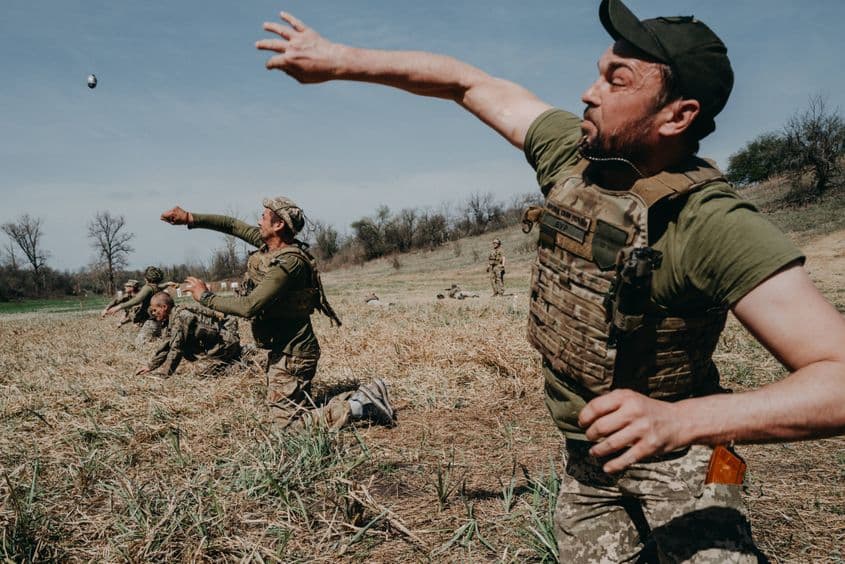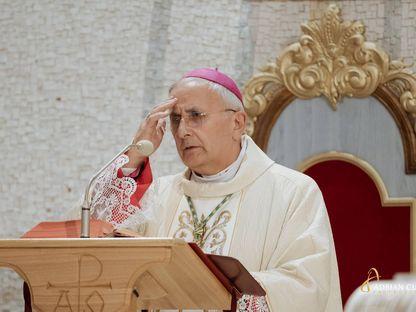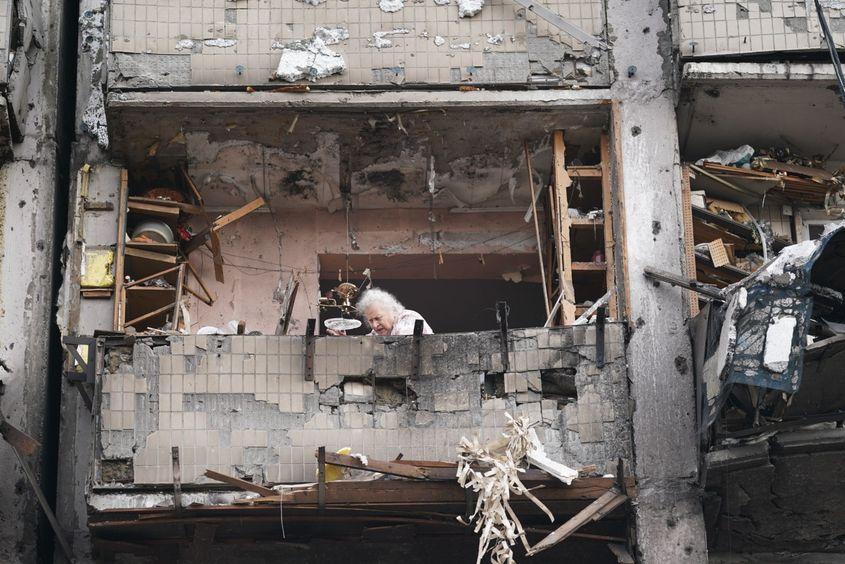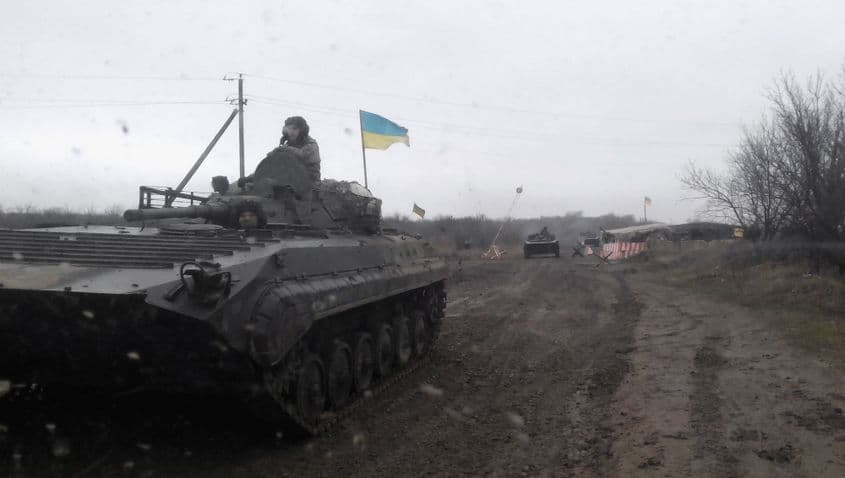Tanc T-64 gata de luptă în regiunea Donbas. Imagine ilustrativă. Foto: ID 196188981 © Vadym Farion | Dreamstime.com
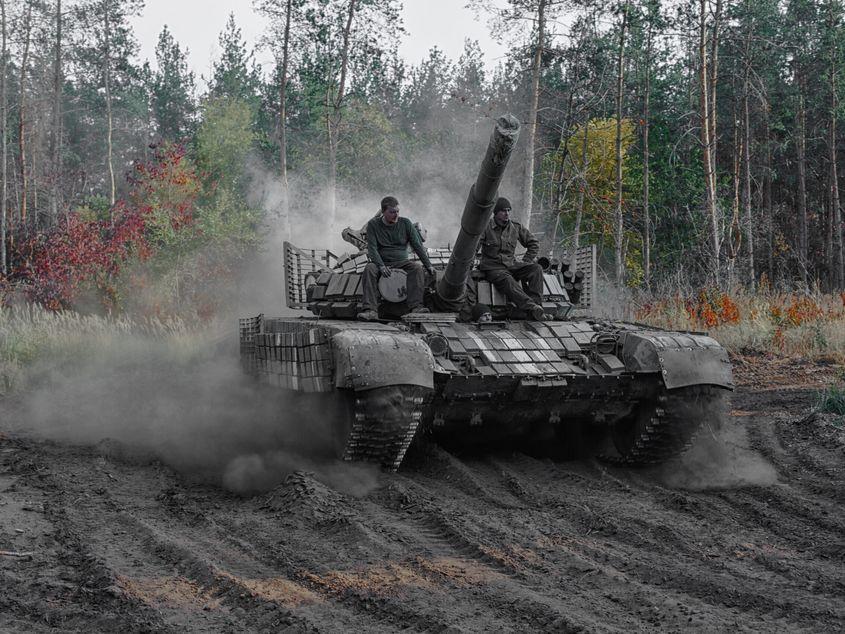
Tanc T-64 gata de luptă în regiunea Donbas. Imagine ilustrativă. Foto: ID 196188981 © Vadym Farion | Dreamstime.com
23/08/2024
Interview: "The War Has Come to Russia's Doorstep". The Ukrainian Surprise Attack in Kursk: Military Incursion or Full-Fledged Offensive?
Look closely at Putin's face: it may be the best indicator of how the war in Ukraine is going. For the past few days, Putin's face, as seen in official photos or videos, has returned to the greenish-gray hues from the early days of the Russian invasion of Ukraine. Now, Putin's grim expression is caused by another invasion: one that is more symbolic and strange—the Ukrainian army's invasion of Russia.
Recently, Ukrainian troops launched a surprise attack in Russia's Kursk region. It’s quite possible that even Ukrainian military strategists were caught off guard; what was timidly referred to as an „incursion” just a few days ago has gained unexpected momentum and is beginning to take shape as a full-fledged offensive.
A new front has opened in Russia (Putin becomes the first Russian president to lose military control over some territories since Stalin), and the news is increasingly surprising.
Reports already speak of nearly 1,000 square kilometers under Ukrainian control, dozens of localities „captured” by Kyiv’s soldiers, hundreds of thousands of Russian civilians evacuated, and hundreds of Russian prisoners. Recently, an entire company—around 100 soldiers—surrendered in Kursk, the largest number of Russian prisoners taken in a single day since the war began.
Moreover, Kyiv has decided to reinforce the forces in the region and send „elements” (likely company or at most battalion-level units) from two elite brigades already heavily tested on the southern Ukrainian front: the 82nd and 95th airborne (paratrooper) brigades, which, according to estimates by Western military experts, would bring the total to about six Ukrainian brigades present on the Russian front.
Putin responded by placing a former security officer in charge of Russian army operations. Will this provoke a new crisis within the military leadership? How will the Russian soldiers react? Will the Russians be able to repel the Ukrainian advance without pulling valuable reserves from southern Ukraine, where they are trying to break the front? How long can the Ukrainians hold out? What are Kyiv's military and political objectives?
These are some of the questions answered by Romanian military analyst Sandu-Valentin Mateiu, a retired commander of the Romanian Army.
PressOne: In military terms, how can we define what is happening now in Kursk? Is it an incursion, a surprise attack, or can we already talk about the beginning of a Ukrainian offensive?
Sandu-Valentin Mateiu: I consider that we can define it as an offensive. It’s not a reconnaissance in force, and it’s not an incursion—meaning that the initial objective was not just to strike and retreat. It’s an offensive that, at the strategic level, has only the temporary occupation of Russian territory, with the final goal being, after achieving certain military and political objectives, a gradual withdrawal while inflicting as many losses as possible on the enemy. I believe this is the best definition.
Mulți ne citesc, puțini ne susțin. Fără ajutorul tău, nu putem continua să scriem astfel de articole. Cu doar 5 euro pe lună ne poți ajuta mai mult decât crezi și poți face diferența chiar acum!
The Ukrainians will adapt if they achieve that objective at the military level, transferring troops (Russian troops from the southern Ukrainian front – ed.), because they caught the Russians without reserves, and in the end, the Russians will have to send elite troops from the southern front. It has also affected their communication lines.
How far can the Ukrainians go?
I don't think they will reach a strategic objective, such as the city of Kursk or the nuclear power plant, but they have occupied terrain that they can easily defend. In the end, the effect is political: they have put the Kremlin in a difficult position by overturning the situation. Temporarily, they have the initiative, but more importantly, they have destroyed the myth that Russia is not at war. Russia now has its territory occupied for the first time since World War II.
Training of the second Ukrainian international legion in the Donetsk region. Photo: 444.hu / Wojciech Grzedzinski / Anadolu
So far, the situation was critical for the Ukrainians on the southern front (especially on the Toretsk-Prokhovsk-Avdiivka axis). How was this surprise possible in Kursk?
Predator in Robes: The Diocese of Iași and the Vatican Buried a Sexual Assault Committed by a Catholic Priest Against a Minor in Bacău, Failing to Alert Prosecutors
A Roman Catholic priest abused a 13-year-old girl in the parish where he served in Bacău County: the bishop of Iași knew about it, sent the case to the Vatican, and applied canonical sanctions, but did not notify the authorities, who only intervened later and sentenced him to prison.
First of all, we need to discuss why the situation was critical and remains strategically critical for the Ukrainians. Because the Russians still have superiority in forces. The ratio of soldiers is significant. Superiority in artillery is maintained, as is in aviation, with gliding bombs. The Russians have at least local air superiority. Strategically, Russia is at an advantage, but it is unable to exploit this advantage due to the lack of quality: they are incapable of command and maneuver, yet they were advancing. Kyiv found the answer: maneuver warfare to counter attrition warfare.
How?
First of all, they took a risk: they used the best units they had in their strategic reserve. They still have units in training; there is talk of 14 brigades, but those are in formation, they need equipment, and so on.
Un newsletter pentru cititori curioși și inteligenți.
Sunt curios
They managed to reconstitute the units, concentrate them without being detected. They studied the Russian deployment very well, knowing there were troops in that area. But those were more likely troops in training or recuperation; not to mention that they were border guards, under the FSB, and Chechens, who have very low combat value. Why? They lack motivation. They are bandits who make TikToks.
The Ukrainians managed this surprise at the tactical level. Then the consequences are at the theater of operations level: they manage to force the Russians to transfer troops from one place to another.
This is a significant achievement for the Ukrainians now: showing the vulnerability of the Russian military system. The Russians are not capable of blocking this attack. They have thrown conscript units into the fight: this is a significant political problem in Russia.
The Russians already had a problem with this grinder-type mobilization: the Russians lose 1,000 soldiers a day and bring another 1,000 soldiers under arms each day, with increasingly higher bonuses. And yet they can no longer compensate. They simply recycle them: they take them from the yard, pay them, and then bury them.
The Russians don’t care about people. They see them as bullets. With such a volume of people, between 550,000 - 700,000 soldiers, they have not been able to handle an offensive of 1,000 people. This shows a significant quality problem.
Putin has made some changes in the command chain. What do these symbolize, and what do they say about how the war is unfolding in high-ranking offices in Moscow?
The command and control chain is affected by the problem of corruption. Putin has further complicated matters: he created that counterterrorism action. In the theater, he appointed Alexei Dyumin, his protégé. Coming from the position of bodyguard, he passed through the GRU, oversaw special troops, but he has never commanded combat actions, not even at the battalion level, let alone at the brigade level.
I believe the Russians are shooting themselves in the foot because of Putin’s FSB-style attitude. This shows a lack of trust in the military—in Gerasimov (Valery Gerasimov, Chief of the General Staff of the Russian Army – ed.)—when he appoints his own houseman.
The principle of unity of command is being violated. There will be competition for resources. Dyumin will ask Gerasimov for troops, and Gerasimov will say, "Wait, I’m fighting here." Then the phone call from Putin will come, forcing Gerasimov to give troops.
The Russians made this mistake before when they invaded Ukraine. I believe this will complicate things; it will be difficult for them.
The Ukrainian attack in Kursk is a „significant psychological blow” for the Kremlin
Sandu-Valentin Mateiu: The Russians will not be able to use aviation: their great innovation—the Su-34 aircraft with gliding bombs—cannot perform dynamic targeting (against moving targets), only static targeting, striking fixed objectives. Moreover, the Ukrainians are already hitting the airfields from which these planes take off. And when the Russians take a risk, the Ukrainians shoot them down. They’ve shot down helicopters and even a Su-34.
And the Russians have fewer and fewer such aircraft: at the beginning of the war, they had about 130. If we go by the numbers, they are down to 100. But a simple rule means that only 50 of these are fully operational (at any given time) across the entire front.
The Ukrainian action in Kursk is a mosquito bite on an elephant, knowing that the elephant is weakened. If the bite has the effect of causing an infection—so be it. The war has come to Russia's doorstep. This is a significant psychological blow.
An elderly woman tries to gather what she can from her apartment, bombed by Russian forces. Kyiv, Ukraine. (Wolfgang Schwan - Anadolu Agency)
PressOne: When do you think the situation becomes critical for the Russians if the Ukrainians cannot be stopped and remain in the Kursk region? Are we talking about weeks? Months?
I think we can think in three dimensions: time, space, and losses.
If the action drags on for several weeks or months, with the Russians being unable to put enough pressure to force the Ukrainians to withdraw, then it will be a problem (for Moscow). This would show that what they did in years, with thousands of people lost daily, the Ukrainians did in a few days, with dozens of losses.
The second element is space: If the Ukrainians succeed, by the time they encounter significant Russian resistance, in reaching important objectives (let’s say they can bomb Kursk or reach the nuclear power plant, cut the E38 communication line, or reach Lgov), then there is a prestige issue: an important Russian territory has been occupied. Combined with the first element—time—things get complicated.
It depends greatly on how the Ukrainians manage to establish their defense setup. The terrain is conducive; we will see.
The third element is related to losses. To the extent that the Russians suffer heavy losses, which they might, because of the political pressure, this could propagate within the army. Things are going increasingly worse in Donbas, and people realize they are cannon fodder. And if we add sacrificed conscript soldiers to the equation, things get more complicated.
Lessons we can learn from the Ukrainian army these days
Have the Russians started transferring troops from southern Ukraine?
They have started to bring them, but they are bringing them from wherever they can, including from Kaliningrad. They are bringing some from the South, like the 810th from Kherson, or elements. I don’t know if the essential element that interests the Ukrainians has been realized. I don’t know if they’ve taken troops from that area on the Prokhovsk-Avdiivka axis, which is where it hurts the Ukrainians.
I think in this rush for „establishing order” in Russia, the Ukrainians will see that the pressure decreases. If the pressure does not decrease on the essential fronts, they will transfer troops there to put the Russians in difficulty to stop this slow but steady march towards occupying Donbas.
What lessons can be learned from the Ukrainian action in Kursk (including for Romanian army strategists)?
The first is that maneuver warfare is possible even in the drone era when the battlefield has become quasi-transparent. Maneuvering (of troops) works, even if you don’t have ensured air superiority. So far, the Ukrainians have not been overwhelmed, and this shows that they have found ways to compensate—there’s an entire electronic warfare system in place.
The second issue: despite the difference and the ratio of forces in men, artillery, and aviation, the Russian army is not performing. This is an important lesson: as soon as the Ukrainians manage to change the rules of the war favored by the Russians (war of attrition, where numerical superiority counts) and turn it into maneuver warfare (where quality matters, from the chain of command to the soldier’s motivation), the Russians are thrown off their game and lose.
The third conclusion is at the political level: the narrative created by Russia—„Ukraine will lose anyway, because that’s the ratio of forces, look at the numbers in people, artillery, and aviation”—has changed. At this moment, Putin can no longer say, „We can make peace at any time; let’s negotiate based on realities.”
This text is part of a series of articles proposed by TEFI, a cross-border editorial project developed by some of the most powerful newsrooms in Central and Eastern Europe: Gazeta Wyborcza (Poland), Magyar Jeti / 444 (Hungary), SME (Slovakia), Bellingcat (Netherlands), PressOne (Romania), united in a consortium funded by European funds, aiming to promote topics related to national and regional security.

Avem nevoie de ajutorul tău!
Mulți ne citesc, puțini ne susțin. Asta e realitatea. Dar jurnalismul independent și de serviciu public nu se face cu aer, nici cu încurajări, și mai ales nici cu bani de la partide, politicieni sau industriile care creează dependență. Se face, în primul rând, cu bani de la cititori, adică de cei care sunt informați corect, cu mari eforturi, de puținii jurnaliști corecți care au mai rămas în România.
De aceea, este vital pentru noi să fim susținuți de cititorii noștri.
Dacă ne susții cu o sumă mică pe lună sau prin redirecționarea a 3.5% din impozitul tău pe venit, noi vom putea să-ți oferim în continuare jurnalism independent, onest, care merge în profunzime, să ne continuăm lupta contra corupției, plagiatelor, dezinformării, poluării, să facem reportaje imersive despre România reală și să scriem despre oamenii care o transformă în bine. Să dăm zgomotul la o parte și să-ți arătăm ce merită cu adevărat știut din ce se întâmplă în jur.
Ne poți ajuta chiar acum. Orice sumă contează, dar faptul că devii și rămâi abonat PressOne face toată diferența. Poți folosi direct caseta de mai jos sau accesa pagina Susține pentru alte modalități în care ne poți sprijini.
Vrei să ne ajuți? Orice sumă contează.
Share this


